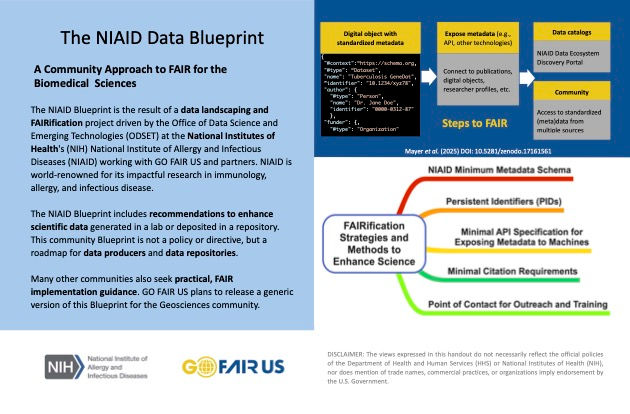GO FAIR US at International Data Week 2025
- Ismael K.G., Christine Kirkpatrick, and Julianne Christopher
- Nov 3, 2025
- 4 min read
Updated: Nov 5, 2025
GO FAIR US was honored to attend and lead sessions during International Data Week (IDW) 2025, held in Brisbane, Australia. This year’s theme was “Data for Positive Change: empowering communities and advancing research.” As strong advocates for the principles of Findability, Accessibility, Interoperability and Reusability (FAIR), we share in IDW’s spirit for good data practices.
IDW marked the debut of A Blueprint for Including Digital Objects in the NIAID Data Ecosystem, or “the Blueprint” (Meyer et al., 2025). GO FAIR US, represented by Christine Kirkpatrick and John Graybeal, presented on the Blueprint as a collection of curated FAIR resources, and as a way of scaling FAIR assessment in the following sessions:
The yellow pages of FAIR-enabling resources. The meeting explored how well-organised collections of FAIR-enabling resources can support the development of discipline- and community-specific guidelines, workshops, and other interventions for the purpose of lowering the barriers for (re)use and integration of different types of digital assets. Read more about the session here.
FAIRifying at Scale: Lessons from NIAID’s Ecosystem-Wide Approach to Repository Interoperability. This flash talk, delivered by Christine Kirkpatrick and John Graybeal, contextualized the NIAID Data Blueprint—illustrated below. The Blueprint results from GO FAIR US’s engagement with NIAID, and includes recommendations to enhance scientific data generated in a lab or deposited in a repository. The community Blueprint is not a policy or directive, but a roadmap for data producers and data repositories. Read more about the Blueprint on NIAID’s website.

The day after GO FAIR US’s contributions at IDW, the CODATA General Assembly took place. During the General Assembly, Christine Kirkpatrick was pleased to be re-elected as Secretary General of CODATA, marking her second term in the role.Spurred by a partnership from GO FAIR US’s Natalie Meyers and with funding from Luksic Foundation, Chile’s new National Committee sent a delegate for the first time; Rodrigo Roa. Rodrigo—also from the Data Observatory—was subsequently elected as a member of the CODATA Executive Board. This brings Latin American representation to the Executive Committee for the first time in several years.
IDW included a wide array of colocated activities, many of which featured activities shaped by or including GO FAIR US colleagues. Additional events included:
Interoperable and federated vocabulary services. Vocabulary services are a critical component of data sharing infrastructures. If shared across infrastructures, then a more global ecosystem for data sharing and reuse can be supported. The session explored the required scope and evaluation criteria for a general solution, and examine how several initiatives meet these requirements. John Graybeal spoke about OntoChoice: A collaborative project documenting evaluation strategies for choosing terms and ontologies, ontology selection and recommendation. Read more about the session here.
Bridging the Data Science and Research Data Communities Through Education and Shared Practices. The data science and research data communities tend to have separate venues for convening, membership, and educational tracks. This session consisted of short presentations and a panel discussion that was moderated by Christine Kirkpatrick, and which explored how the two worlds can come together in the areas of education, training, and data stewardship practices. Read more about the session here.
The Role of Data in AI for Science. Christine Kirkpatrick and Tyng-Ruey Chuang discussed the CODATA Concept Paper in data in AI for science. The speakers presented a brief overview of the opportunities, challenges, and recommendations from the paper, as well as a perspective on redefining FAIR for the AI age. Read the presentation’s full abstract on page 214 here.
Project Identifiers: Enabling FAIR with project identification and metadata. Research projects serve as hubs that link researchers, organizations, outputs, and funding—yet standardised approaches to identifying and documenting projects remain underdeveloped globally, creating a significant gap in the research information landscape. The session addressed fundamental questions around project identifier implementation: governance models for project metadata, integration with existing persistent identifier (PID) infrastructures, metadata schema requirements, challenges with legacy project data, and pathways to broad adoption across diverse research communities. Chris Erdmann presented on the role that Research Activity Identifiers (RAiD) can play in this respect. Read more about the session here.
AI for Metadata Enhancement, Metadata for AI Readiness: how do we ensure a virtuous rather than a vicious circle? Speakers and attendees explored the intriguing and potentially urgent interaction (and even codependency) between high quality metadata and semantic richness on the one hand, and Generative AI and large language models on the other. Doug Fils contributed to slides on MLCommons’ Croissant by Vyacheslav Tikhonov. Read more about the conversation here.
Bridging AI international policy and practice: the AIDV approach. The AI and data visitation (AIDV) working group demonstrated how their practical tools—such as the global adaptation of the AI Bill of Rights, consent guidance for data visitation, secure processing environment protocols, and ethics review criteria—can support responsible and coordinated implementation of international AI policy in scientific research environments. Natalie Meyers is co-chair of the working group, and co-author of the AI Bill of Rights. Meyers also presented on FAIRifying political science research. Read more details here.

We remain deeply grateful for the support from the GO FAIR Foundation, NIAID’s Office of Data Science and Emerging Technologies, CODATA, the Research Data Alliance, and the IDW organizers. As proud as we are of the work we are leading at GO FAIR US, events like IDW emphasize what matters: the community and much wider, global ecosystem that is driving robust data and information management practices.



Comments